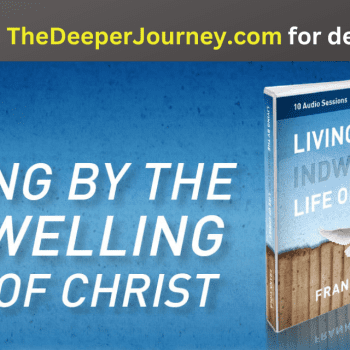“Be careful to do as the Lord your God has commanded you; you shall not turn aside to the right hand or to the left.”
~ Deuteronomy 5:32
Ever since I met the Lord some 30 years ago, I’ve been an evangelical. However, the term today has become so cluttered and muddied, and the “evangelical movement” has become so diluted and diverse, that it requires both definition and explanation.
Back in 2012, I coined the term “beyond evangelical” which best describes myself and many others within the big evangelical tent. Most of whom are in their 20s, 30s, and 40s.
Here’s a description of the term.
First, “beyond evangelical” doesn’t mean “non-evangelical.”
The phrase “beyond evangelical” is short for “moving beyond evangelicalism,” which is a theological movement (not people or persons).
I am an evangelical. What is more, I stand with the Apostle’s Creed and the Nicene Creed (just in case anyone was wondering). In this regard, I agree with Alister McGrath’s statement that “evangelicalism is historic Christianity. It’s the standard bearer of historic, orthodox Christianity.”
But the term “evangelical” embraces a wide canopy. So much so that the word is becoming increasingly vague and open to interpretation. Evangelicalism has become a hyphenated movement. For instance, “old-evangelical,” “neo-evangelical,” “conservative-evangelical,” “post-evangelical,” “post-conservative evangelical,” “ecumenical-evangelical,” “charismatic-evangelical,” “young-evangelical,” etc. are all in common use today. American historian Mark Noll rightly points out that evangelicalism is made up of “shifting movements, temporary alliances, and the lengthened shadows of individuals.”
The word “evangelical” has become so generalized that people like Jim Wallis and Al Mohler stand on the oppose sides of the evangelical spectrum. The same is true for Rob Bell (on the left) and John MacArthur (on the right), both of whom claim to be “evangelical.”
As western culture has balkanized and changed the meaning of words over time, the same is true for religious vocabulary. We can no longer take for granted the meaning of terms like “evangelical” or “evangelicalism.” The evangelical formulas that worked in the past have evolved. So there’s very little consensus today as to their exact meaning.
Second, “beyond evangelical” doesn’t mean “post-evangelical.”
Popularized by Dave Tomlinson, the term “post-evangelical” is often equated with the emerging church movement/phenomenon. While I have close friends who identify themselves with this movement, I do not. I appreciate my emergent friends and applaud some of their concerns, while freely disagreeing with other concerns.
In our book Jesus Manifesto, Leonard Sweet and I address what we believe to be some of the critical weaknesses of “emergent” Christianity as it relates to the Person of Jesus Christ (see Chapter 7). We also address some of the critical weaknesses we see in “the Christian Right.”
Right or wrong, you know where I stand on those issues.
Now here’s something I’d like to say to my friends who are analyzing evangelicalism today. The future of evangelicalism is not restricted to a choice between the left or the right.
Another direction exists: It’s forward. As Sweet and I say in our book,
The body of Christ is at a crossroads right now. The two common alternatives are to move either to the left or the right. It’s our observation, however, that we are living in a unique time, when people are frozen as they look in either of those directions. When they look to the left, they decide that they cannot venture there. When they look to the right, they feel the same. Whether they realize it or not, people are looking for a fresh alternative—a third way. The crossroads today, we believe, is one of moving forward or backward (Jesus Manifesto, p. xiii).[1]
Those of us who are moving “beyond evangelical” resonate with that statement. The only gear we have is “forward.”
Third, for many evangelicals, the historical use of the word “evangelical” includes four key notes.
The British evangelical historian David Bebbington has defined the word “evangelical” by the following four notes. Mark Noll also uses this description as well as a host of others.[2] Bebbington’s “evangelical quadrilateral” includes:
Biblicism – being Bible-centered, which would include the belief that the Bible is the Divinely inspired authority for life and faith; it is trustworthy and sufficient.
Conversionism – being conversion-centered, which would include the need for being converted to Jesus Christ.
Crucicentrism – being cross-centered, which would include emphasizing the death of Jesus for salvation.
Activism – being activist-centered, which would include living the Christian life, evangelizing, and helping those in need.[3]
I hold to all of the above. Therefore, I am an evangelical in the historic sense. But going “beyond evangelical” means asking some incisive questions like . . .
*In what sense is the Bible authoritative? And how exactly does a person hear and encounter God through the Scriptures? What’s the main point of the Bible . . . the grand narrative?
*How is a person converted? And what does conversion give an individual? What does it include?
*What happened at the cross exactly? How does Jesus’ death save us? Does His death on the cross do more than just forgive sins? If so, what?
*How should Christians present the gospel? What is God’s central mission exactly? And what does the Scripture teach concerning how we are to fulfill that mission? (I predict that the question “What exactly is the Mission?” is going to define the missional church conversation over the next five years. This is always assumed . . . grossly so. So hide and watch.)
Since my blog’s existence in 2008, I have weighed-in on some of these questions. My books also address them. But I’ve only scratched the surface. This leads us to the next point.
Fourth, those of us who have moved “beyond evangelical” have expanded the evangelical quadrilateral with four additional notes.
Christ-centered – a recovery of the Bible’s consistent and razor-sharp emphasis that Jesus Christ is supreme, preeminent, sovereign, the center of biblical revelation, and the practical, living head of the church. In today’s evangelicalism, countless religious “themes” and “subjects” have replaced Christ as the centrality and supremacy.[4] My message Epic Jesus: The Christ You Never Knew illustrates and expands what I mean by “Christ-centered.”
Resurrection Life-centered – what stands beyond the cross is the resurrection of Jesus. The resurrection means so many things. It means the beginning of the new creation. It means the triumph of God over all things, including death, His greatest enemy. But it also means that God’s people can live in the foretaste of our future resurrection, participating in its life and power here and now. It means that Jesus Christ is still alive, can be known, and has come to live out His resurrected life in and through us. Learning to live by the indwelling life of Christ in a corporate context and all that it involves is a missing note in modern evangelicalism. (The latter is focused on imitating Jesus as an individual through one’s own efforts.) Living by the life of Christ also means being radically sold out to Jesus without being legalistic on the one hand or libertine on the other.[5]
Body Life-centered – the typical evangelical holds to the idea that the Christian life is an individual pursuit. “Church” is something Christians attend in order to be motivated to go out and serve as an individual Christian and live a strong individual Christian life. But those who have gone “beyond evangelical” believe that the church is, as Dietrich Bonhoeffer put it, Christ existing as community. Church is not a denomination, a service, or something you attend. It’s the experience of the body of Christ, a la, “body life.” In fact, the Christian life doesn’t work outside of a local, shared-life community that’s meeting under the headship of Jesus Christ as His body on the earth. Consequently, how a local church functions and expresses itself is eminently important.[6]
Eternal Purpose-centered – God has an eternal purpose, or grand mission, that provoked Him to create. That purpose goes beyond the saving of lost souls and making the world a better place. God’s purpose transcends evangelism and social action (both of which are focused on meeting human needs). The eternal purpose is primarily by Him, through Him, and to Him. Meeting human needs is a byproduct, not the prime product.[7]
Contemporary evangelicalism in America is essentially a reactionary movement.[8] As a result, it has produced an “us” vs. “them” mentality.
Those of us who have gone “beyond evangelical” have moved on from the early 20th-century fundamentalist vs. modernist debate that our forefathers passionately fought . . . a fight that continues to rope many contemporary Christians into today, some 100 years later.
This fight leaves people with a false choice between left or right. The alternative direction of “forward” doesn’t appear on the radar screen.
Those who are “beyond evangelical” have moved on from that battle to discovering, exploring, and displaying the unsearchable riches of Jesus Christ with our brothers and sisters in Christ.
(How often do you hear that language in evangelical circles? The vocabulary we find in books like Ephesians emerged from a living experience. An experience that is available to Christians today, though it be rarely found.)
You Are Not Alone
“The desperate need today is not for a great number of intelligent people, or gifted people, but for deep people.”
~ Richard Foster
What follows is a collective confession of those who have moved beyond evangelical.
Countless Christians I’ve met have uttered these statements in face-to-face conversations, over emails, over coffee at conferences, and on this blog. I’ve compiled them all, editing them slightly for consistency. Together, they form a collective confession of sorts reflecting the thoughts and feelings of those of us who have moved beyond evangelicalism.
–
*We have grown tired of the media routinely characterizing “evangelicals” as if we were all part of “the Christian Right.”
*We have become weary of Christian progressives deeming themselves to be the “new evangelicals” in reaction to the Religious Right.
*We are turned off by the left vs. right posturing and the left vs. right political/theological debates.
*We’ve looked to the right and do not wish to venture there. We’ve looked to the left and do not wish to venture there either. The direction we feel pulling our hearts is above and forward.
*We believe that both the Religious Right and the Religious Left have vital truths to contribute. We also believe that they are both missing vital truths. We believe their focus is mainly “issues” rather than Jesus Christ.
*We want to see the Christian Right and the Christian Left learn from one another as well as learn from those of us who are not part of either stream. We feel that all Christians should be open to learn from one another, for we are all parts of the Body of Christ. None of us has the lock on all truth. Each member of the Body has a portion of the riches of Christ.
*We are sickened that so many evangelical Christians are either legalists or libertines (see Chapter 10). We want Christ’s lordship and we want His liberty as well. We wish to follow Jesus without being legalistic or libertine.
*We hold to the orthodox teachings of Scripture regarding the Person of Christ, His work on the cross, the inspiration and truth of the Bible, the Triune nature of God (the Godhead), but we are weary of Christians dividing over peripheral doctrines and their own private interpretations of Scripture on non-essentials. We passionately agree with Augustine’s sentiment: “In essentials unity, in non-essentials liberty, in all things charity.”
*We’ve grown weary of the way that Christians routinely mistreat their fellow brothers and sisters in Christ, being quick to judge their motives, thinking the worst of them, condemning them, slandering them, gossiping about them, etc. We believe that being a Christian means treating others the same way you want to be treated (Matt. 7:12)—the forgotten words of Jesus (see Chapter 20). With deep remorse, we empathize with the words of Gandhi: “If it weren’t for the Christians, I’d be a Christian.”
*We’ve grown tired of the shallowness that marks so much of evangelical Christianity today. The same sermons, the same principles, the same teachings, etc. We are looking for depth in the Christian life. We know there’s more to Jesus Christ, more to His church, and more to the spiritual life than what’s been promoted in establishment Christianity. There is a cry in our hearts that says, “There’s got to be more than this.”
*We are saddened that the doers, feelers, and thinkers of the body of Christ have separated and isolated themselves from one another instead of learning from each other.
*We’ve grown sick of the entertainment-driven, duty-driven, guilt-driven message that’s laced in most Christian sermons and books today. Human-induced guilt and the conviction of the Holy Spirit are two very different things.
*We are tired of the tendency of some Christians to elevate certain sins that others commit while minimizing or justifying their own sins.
*We’ve grown tired of Christian leaders attacking and competing with one another, instead of networking together and supporting one another.
*We’re weary of the “good ole’ boy system” that’s present in much of establishment Christianity today because it ends up elevating and protecting the status quo and silencing the voices of the prophets.
* We’ve grown sick of Christians saying nasty things about their fellow brethren (whom they don’t know personally) on social media networks. And then justifying it in the name of God.
*We are saddened that so many Christians will believe what they hear about other believers second or third-hand, instead of going to those believers themselves and simply asking them questions in good faith.
*We’ve grown weary of some Christians falsely branding their fellow sisters and brothers in Christ with the words “heretic” and “apostate” when those same believers actually uphold the orthodox creeds of the faith.
*We’ve grown tired of Christians trying to rope us into the liberal vs. conservative battles of the 19th and early 20th centuries.
*We abhor elitism and sectarianism. We are open to all Christians of all stripes, receiving all whom Christ has received (Rom. 15:7).
* We stand for the unity of the Body of Christ. At the same time, we fiercely and passionately stand firm on our convictions regarding the absolute and unvarnished supremacy of Jesus, His indwelling life, God’s timeless purpose, and the church as a Christ-centered community.
*We want the Lord. We want spiritual depth and reality. We want HIM in all of His fullness. Everything else is secondary to us, and often, we find them to be largely a distraction.
If you resonate with any of the above sentiments, then be encouraged:
You are not alone.
In addition, you may be interested in the Deeper Christian Life Network which is designed for people who are looking for others of like heart and mind.
Notes
[1] The middle structure of evangelicalism collapsed long ago (as early as Harold Lindsell’s The Battle for the Bible), leaving only the left wall and the right wall of the building. This collapse distorted the evangelical response to the rise of postmodernism by forcing it into the mold of the modern left vs. the modern right. In this regard, the “new Reformed” and “Emergent” movements are really as modern as the fundamentalist vs. liberalism groups that preceded them. For this reason, neither one is capable of salvaging evangelicalism. In addition, the third direction of “forward” is not based on the idea that evangelicalism needs a better theology. It’s instead based on the question of how the Christian faith is to be lived out in its proper context, that is, as a kingdom community discovering and displaying Christ. The scourge of evangelicalism is that it has centered itself on making correct propositional statements rather than on a way of living in, through, and for the Lord Jesus in a shared-life local community.
[2] The Anglican evangelical scholar Alister McGrath stretches his definition to six hallmarks, but Bebbington’s quartet is much more popular. The Reformed Canadian John Stackhouse uses six also, but they are different from McGrath’s. American historian George Marsden adds a fifth element to Bebbington’s list: transdenominationalism. All of this just underscores the fact that the term “evangelical” has become a clay word. Donald Dayton in his The Variety of American
Evangelicalism rightly points out that the variety within evangelicalism defies a single description. It should also be noted that historians trace evangelicalism back to the revival movements of the 18th and 19th centuries under George Whitefield, John Wesley, and Jonathan Edwards. Others trace it back to the Reformers.
[3] Winston Churchill said that Britain and America were two countries separated by a common language. The same can be said about the evangelical camp. Using the same terms does not equal agreement on their meaning.
[4] Jesus Manifesto is dedicated to this note.
[5] Revise Us Again is dedicated to this note. Books by other authors listed in the Spiritual Growth Shelf also address it. See also my post, Legalism, License, Lordship, and Liberty.
[6] Pagan Christianity, Reimagining Church, and Finding Organic Church are dedicated to this note. Also the messages Vantage Point and Who is This Woman? Books by other authors listed in the Church Life Shelf also address it.
[7] From Eternity to Here is dedicated to this note. Also the message entitled The Eternal Purpose. Books by other authors listed in the Mission of God Shelf also address it. I realize that Calvinists will equate what I’m saying in this last point to be reduced to “the glory of God.” But there’s something higher in God’s heart that He is after, and “glory” is often misunderstood.
[8] Another aspect of evangelicalism, though often unspoken, is that it builds its theology on the basis of apologetics. This raises an important question: should our theology be built on apologetics or on the intention to know God in Christ and live by His life?
[9] Evangelicalism’s social, cultural, and political influence has waned greatly and continues to do so. The popular perception of evangelicals should also be noted. Many view “evangelical Christians” as closed-minded, judgmental, self-righteous, condemning, hypocritical (deeming their own sins as less serious than that of others), unloving, and plagued by internal hostility and conflict (they often attack their fellow brethren). This is yet another reason why many Christians are moving “beyond evangelical.”

















